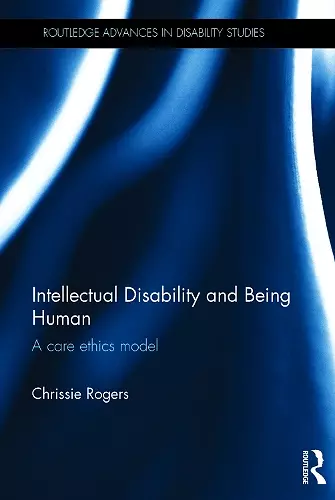Intellectual Disability and Being Human
A Care Ethics Model
Format:Hardback
Publisher:Taylor & Francis Ltd
Published:10th Mar '16
Currently unavailable, and unfortunately no date known when it will be back
This hardback is available in another edition too:
- Paperback£46.99(9781138103238)

Intellectual disability is often overlooked within mainstream disability studies, and theories developed about disability and physical impairment may not always be appropriate when thinking about intellectual (or learning) disability.
This pioneering book, in considering intellectually disabled people's lives, sets out a care ethics model of disability that outlines the emotional caring sphere, where love and care are psycho-socially questioned, the practical caring sphere, where day-to-day care is carried out, and the socio-political caring sphere, where social intolerance and aversion to difficult differences are addressed. It does so by discussing issue-based everyday life, such as family, relationships, media representations and education, in an evocative and creative manner. This book draws from an understanding of how intellectual disability is represented in all forms of media, a feminist ethics of care, and capabilities, as well as other theories, to provide a critique and alternative to the social model of disability as well as illuminate care-less spaces that inhabit all the caring spheres. The first two chapters of the book provide an overview of intellectual disability, the debates surrounding disability, and outline the model. Having begun to develop an innovative theoretical framework for understanding intellectual disability and being human, the book then moves onto empirical and narrative driven issue-based chapters. The following chapters build on the emergent framework and discuss the application of particular theories in three different substantive areas: education, mothering and sexual politics. The concluding remarks draw together the common themes across the applied chapters and link them to the overarching theoretical framework.
An important read for all those studying and researching intellectual or learning disability, this book will be an essential resource in sociology, philosophy, criminology (law), social work, education and nursing in particular.
"Chrissie Rogers's Intellectual Disability and Being Human offers a unique combination of disability theory, care ethics, pop-culture references, and sociological insight. Combining these approaches is unique, and the task is enriched by Rogers's background in sociology and social theory combined with her knowledge of feminist philosophy. Rogers addresses some of the most significant areas of life related to care ethics, including education, mothering, and relationships.
I recommend Rogers's text and I applaud her unique and well-researched combination of ethics of care, capabilities approaches to disabilities, sociological theory, and pop-culture references. It is rare that a book combines such careful scholarship and clear writing with an eye toward practical knowledge and making a genuine difference in the everyday lived experience of real women."
-Christine A. James, Valdosta State University
Chrissie Rogers's Intellectual Disability and Being Human offers a unique combination of disability theory, care ethics, pop-culture references, and sociological insight. Combining these approaches is unique, and the task is enriched by Rogers's background in sociology and social theory combined with her knowledge of feminist philosophy. Rogers addresses some of the most significant areas of life related to care ethics, including education, mothering, and relationships.
Christine A. James, Professor of Philosophy and Religious Studies, Valdosta State University, USA
Why does society have so little time, space and care for intellectually disabled people? This is the vital question Chrissie Rogers takes on here to offer both a challenge to our care-less society and an alternative imaginary for how we could live care-fully. Through a strikingly innovative account that draws on philosophical ideas, empirical research and cultural analysis, this book makes a powerful and emotive case for a care-ethics model of disability that fills important gaps in existing approaches to critically thinking about intellectual disability.
Professor Janice McLaughlin, Professor of Sociology, Newcastle University, UK
This is a highly original and powerful book. It adeptly weaves together theory, empirical research and personal experience to present a compelling new care ethics approach to disability.
Val Gillies, Visiting Professor, Department of Sociology, Goldsmiths University of London, UK
Chrissie Rogers’s beautifully written book draws the reader in and keeps them reading. The thoughtful theoretical discussion, sensitively presented data and auto/biographical reflection alongside a multi-institutional focus combines to provide a challenging and convincing analysis of the relationships between intellectual disability and the ethics of care/care-lessness. This is an important book and of relevance and interest to those interested in disability, education, motherhood or indeed the human condition more generally.
Gayle Letherby, Honorary Professor of Sociology, Faculty of Health and Human Sciences, Plymouth University, UK
ISBN: 9780415664585
Dimensions: unknown
Weight: 385g
174 pages